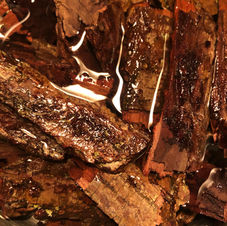

Michael Culbertson
Doctoral student, The Forest School, Yale School of the Environment, Yale Graduate School of Arts and Sciences
Scientists conceptualize and measure ecological phenomena in ways that influence management practices, policy decisions, and economic understanding. I am currently excited about regression to the mean (Eric W. Slesserev, Adrian G. Barnett), specification curve analysis (Uri Simohnson), challenges to current statistical analysis (Stephen T. Ziliak), measurement theory (David Houle), publication bias (John P. A. Ioannidis), criticisms of modern experimental design and evidentiary standards (Nancy Cartwright), abductive inquiry (Jaakko Hintikka), myth of objectivity (Ian I. Mitroff), and practical uncertainties like scale, timing, measurement error, technician error, cognitive bias, and how the types of questions posed relate to the defined metrics and analysis used in ecological research.

“When we assign a value to something in the forest, we are beginning to adjust that object in our focus, and as we bring one thing into focus we simultaneously forces almost everything else out of focus….”
-Chris Maser, The Redesigned Forest, p. 22-23.
“When people want to know what Okuninushi no Mikoto, the Shinto deity of agriculture, carries around in the huge sack on his shoulder, they immediately open the sack and thrust their hands in. They think that to understand the interior of the sack, they must know its contents. Supposing they found the sack to be filled with all sorts of strange objects made of wood and bamboo. At this point, most people would begin to make various pronouncements: “Why this is no doubt a tool used by travelers.” “No, it's a decorative carving.” “No, it's most definitely is a weapon.” And so forth. Yet the truth, known only to Okuninushi himself, is that the object is an instrument fashioned by him for his amusement. And, moreover, because it's broken, he is carrying it around in his sack merely for use as kindling.”
-Masanobu Fukuoka, The Natural Way of Farming, p. 52.
“Who planted the great ancient forests? Who tilled the land? Who provided seed, manure, irrigation, or protection from pests?”
-Bhaskar Save, The Vision of Natural Farming by Bharat Mansata, p. 3.
“The world which is the test of all observations and all hypothetical reconstructions has in itself no system that can be isolated as a structure of laws or uniformities, though all laws and formulations of uniformities must be brought to its court for its imprimatur.”
George Herbert Mead, The Philosophy of the Act, p. 31.
“State government is a hierarchical administrative structure for consciously collecting, processing, and storing information in order to reach and carry out decisions based on that information.”
-William Isbell, Was Huari a State?
“Probably there is no historical event of this magnitude for which a single explanation is adequate, but that growing soil salinity played an important part in the breakup of Sumerian civilization seems beyond question.”
-Thorkild Jacobsen and Robert M. Adams, Salt and Silt in Ancient Mesopotamian Agriculture.

Previous Projects

Foraging

















